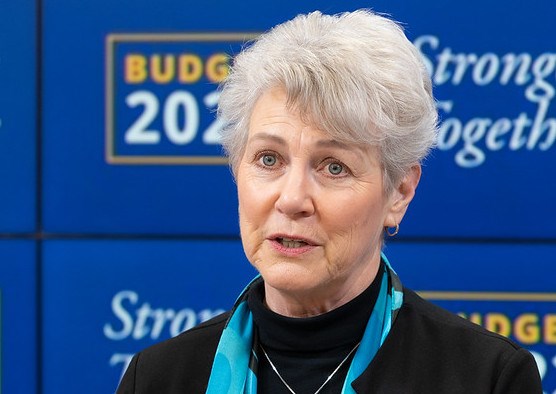It was tough to say what was more alarming in the latest financial update from B.C.’s finance minister — the ballooning size of the provincial deficit, or the seeming disinterest in doing anything about it.
Katrine Conroy delivered a sobering budget update at the legislature Wednesday, tabling a financial document dripping in red ink. Then, she spent the better part of 40 minutes acting like that didn’t matter.
B.C. is projecting a $6.7 billion deficit this year, after the treasury took a $2.5 billion hit in the first quarter of the fiscal year from slumping natural gas prices and the rising cost of fighting summer wildfires.
The provincial government is now on track to rack up a deficit of more than $14 billion over the next three years. There’s no plan to return to balance. Nor is there any plan to trim spending, look for additional savings or introduce new tax measures to try to shore up the worsening financial picture.
In fact, according to Conroy, her government intends to do the opposite.
“At this time what we're doing is we're going to keep providing services to people the way we have been since 2017,” she said.
“We recognize that you need to invest in people in order to have a strong economy, and that's what we're going to continue to do.”
The opposition BC United scoffed.
“Ebynomics isn’t working as inflation takes a serious toll on B.C. families while NDP spending and deficits have exploded under David Eby,” leader Kevin Falcon posted on social media.
“Despite all the NDP spending, the results have never been worse.”
Conroy pointed to the success of B.C.’s financial strategy during the COVID-19 pandemic, which was basically to spend whatever was needed during an emergency.
“We showed during COVID that we did invest in people and we had one of the strongest economies in the country,” she said. “And so we know that that works.”
Except, there is no pandemic emergency anymore. And when there was, it was a major influx of federal spending, not provincial, that turned the economy around to the point B.C.’s $10 billion deficit forecast during the darkest year of COVID-19 magically transformed into a $1.3 billion surplus.
There’s no hope of such a miracle this time around, Conroy admitted.
Nor is there any expectation that one-time income tax adjustments from Ottawa will result in a surprise windfall of billions of dollars, like occurred last year.
Conroy’s comments were fascinating. It’s not that long ago that a finance minister would have found themselves under fire from an angry electorate if they stood at a podium to defend growing, eye-watering, deficit spending for the entire length of a three-year fiscal plan, with no path to return to balance and record provincial debt.
But it seems times have changed.
The public, under financial pressure on all sides from rising interest rates, gas prices, grocery bills, rent and housing, doesn’t seem to care all that much anymore about whether politicians in Victoria are spending beyond their means.
You need look no further than the reaction to news this month that a new Surrey hospital is $1.7 billion over-budget and two years behind schedule before the first shovel hit the ground. Zero backlash. Barely a peep. Most people seem to just want the hospital built, no matter the cost.
It’s possible then that the NDP government’s budget plans don’t really matter to voters. Which is good for the NDP, because there was no evidence Tuesday that there is an actual plan.
The more Conroy spoke, the more you realized the current government fiscal plan appears to be a series of recycled none-too-clever campaign slogans stitched together in preparation for next year’s provincial election.
“It's not the right time to raise taxes and cut people’s services,” said Conroy. “The former government did that and we’re not going to do it.”
Or: “In challenging times, previous governments cut back on supports, increasing fees and cutting services. That's the wrong approach.”
Lost in the all-or-nothing rhetoric would be a more responsible approach: Look at some new revenue sources from adjusted taxes and levies on those who can afford it, and curb discretionary expenses, like hiring, to try and staunch the financial bleeding.
But the NDP is adamantly against such measures. It appears quite comfortable to do absolutely nothing instead.
“There’s an ultimate goal to balance,” Conroy said, at one point, about when or even if the NDP would pull finances out of the red.
The line was reminiscent of the infamous 2014 comment by Justin Trudeau that “the budget will balance itself.”
It feels like awful economic policy. Then again, Trudeau did go on to win the election after his remarks, and remains prime minister nine years later.
So maybe the B.C. New Democrats are on to something. Just keep spending, and either the public won’t care, the budget will balance itself, or both.
Rob Shaw has spent more than 15 years covering B.C. politics, now reporting for CHEK News and writing for Glacier Media. He is the co-author of the national bestselling book A Matter of Confidence, host of the weekly podcast Political Capital, and a regular guest on CBC Radio. [email protected]






